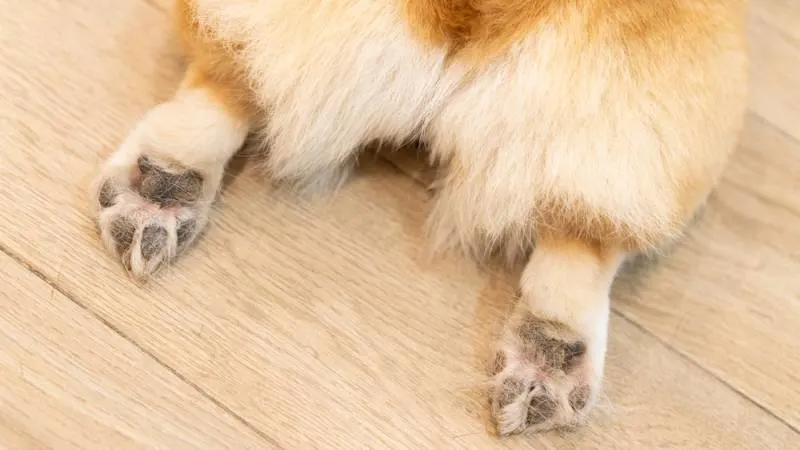One day you notice your corgi’s feet look red and irritated, and they appear to be itchy. Chances are, your pup is suffering from pododermatitis – more commonly known as footpad dermatitis. Pododermatitis is a common condition seen in corgis that causes inflammation of the paws, leading to visible signs such as redness, itchiness, thickening of the skin, and sometimes even pain.
So, what is pododermatitis in corgis? how dangerous is it? And what can be done to help your pup? In this article, we’ll cover everything you need to know about pododermatitis in corgis, including causes, symptoms, diagnosis, and treatment. In the end, we’ll also explain why prevention is key to keeping your pup’s paws happy and healthy.

What is Pododermatitis in Dogs?
Pododermatitis is a multifactorial inflammatory disorder that’s caused by a combination of conditions. This includes bacterial or fungal infections, allergies, hormonal imbalances, poor hygiene or nutrition, underlying health problems such as diabetes and thyroid issues, as well as genetic predisposition.
How Dangerous is It for Dogs?
Pododermatitis can be a serious condition that can lead to permanent damage to the skin and underlying tissue if left untreated. It’s also important to note that it can become a chronic condition, leading to recurrent bouts of inflammation. Pododermatitis can be extremely painful for your corgi, so if you think they may have it, take them to the vet right away.

Are Corgis Prone to Pododermatitis?
Yes, unfortunately, corgis are at a higher risk of developing pododermatitis due to their short legs and long backs. This can lead to a higher incidence of pressure sores from contact with the ground, making them more prone to bacterial and fungal infections. It’s also important to note that corgis are prone to allergies, which can further contribute to the problem.
What Symptoms Should I Look Out for?
If you notice any redness, swelling, or tenderness in your corgi’s paws, it may be suffering from pododermatitis. Other symptoms of this condition include pain, itchiness, and irritation. In more severe cases, the skin may be thickened or cracked and there may be signs of infection such as pus or a foul odor.

How Will My Vet Diagnose Pododermatitis in Corgis?
Your veterinarian may use a combination of tests to properly diagnose and treat your corgi’s pododermatitis. This could include blood work to check for underlying health issues, skin scrapings or cultures to test for bacterial or fungal infections, as well as skin biopsies.
What Treatments Are Available?
Treatment for pododermatitis in corgis will depend on the underlying cause. Here are some of the treatments that may be recommended by your vet:
- If a bacterial or fungal infection is present, antibiotics or antifungal medications may be prescribed.
- Allergies will need to be managed with antihistamines, environmental changes, and/or special diets.
- Hormonal imbalances can be managed with supplements and/or medications.
- Poor nutrition and hygiene can be addressed by providing your pup with a balanced diet and regular foot baths.
- In more severe cases, your vet may also recommend laser therapy or cryotherapy.

How Can I Prevent Pododermatitis in Corgis?
The best way to prevent pododermatitis in corgis is to take proactive steps to keep your pup’s feet healthy. This includes keeping their paws clean and dry, trimming their nails regularly, and providing them with a balanced diet.
You should also check for any signs of redness or irritation on your pup’s feet, and take them to the vet if you notice anything out of the ordinary.
Finally, be sure to provide your corgi with plenty of exercise and keep an eye on any seasonal allergies they may have.

The Bottom Line
Pododermatitis in corgis is a dangerous inflammatory condition that’s caused by multiple conditions. If left untreated, it can cause permanent damage to the skin and surrounding tissue. Corgis have a higher risk of developing pododermatitis due to their short legs and long backs, so it’s important to take preventive measures.
If you think your pup may have this condition, take them to the vet as soon as possible. With proper care and treatment plan from a professional, your corgi can enjoy happy and healthy paws.
Related: Do Corgis Have Sensitive Feet? Do Corgis Have Webbed Feet?

